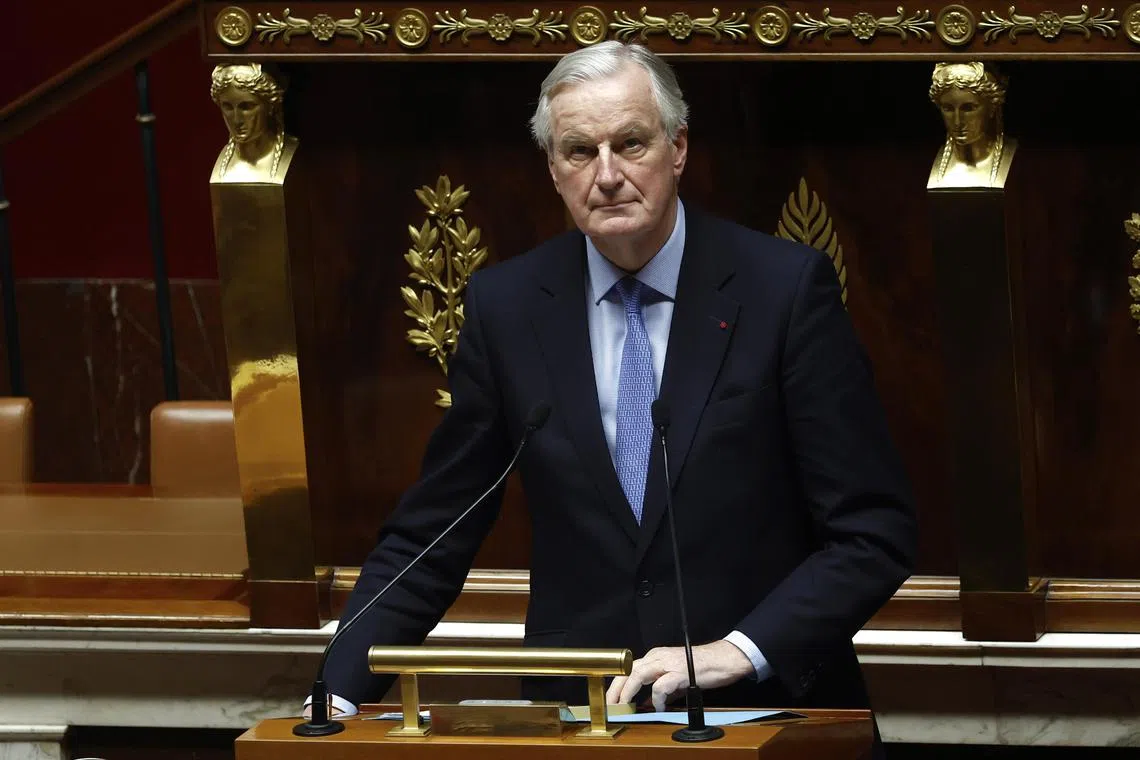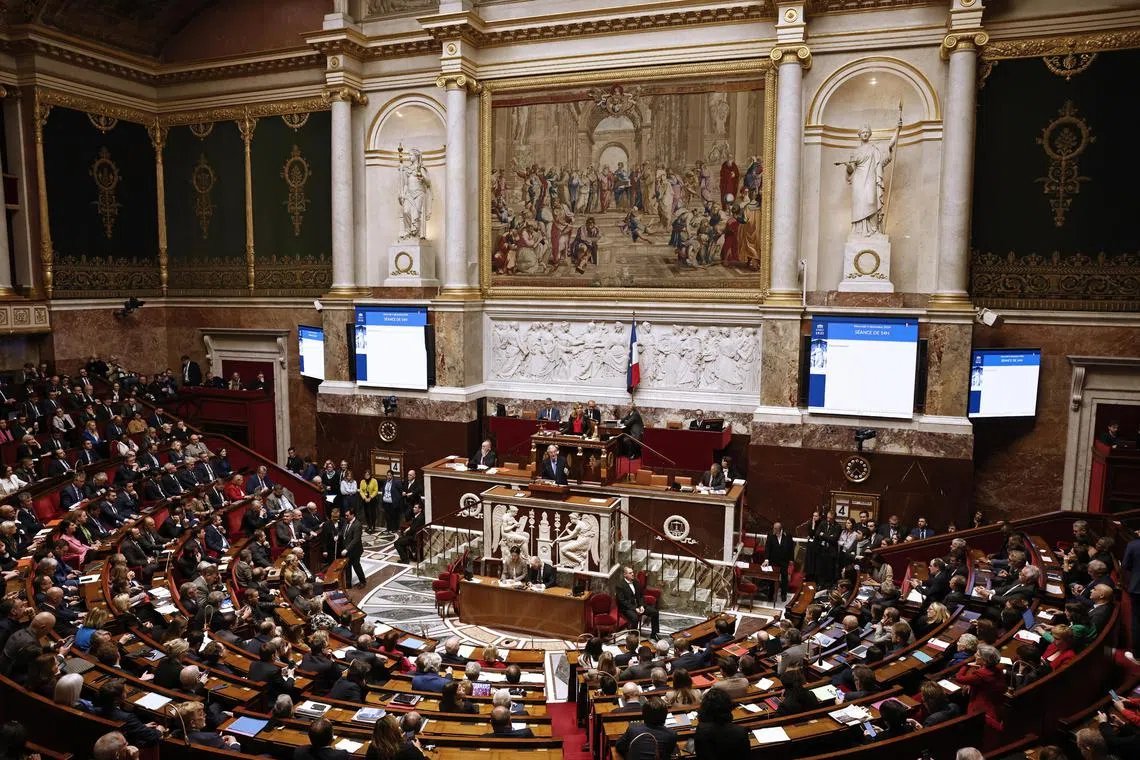France’s government falls in historic no-confidence vote, deepening political crisis
Sign up now: Get ST's newsletters delivered to your inbox

Far-right and left-wing lawmakers joined forces to back a no-confidence motion against French Prime Minister Michel Barnier and his government.
PHOTO: EPA-EFE
Follow topic:
PARIS - French lawmakers on Dec 4 voted to oust the government of Prime Minister Michel Barnier after just three months in office, a historic move which plunged the country further into political chaos.
For the first time in over 60 years, the National Assembly Lower House toppled the incumbent government, approving a no-confidence motion that had been proposed by the hard left but which crucially was backed by the far-right, headed by Ms Marine Le Pen.
Mr Barnier’s rapid ejection from office comes after snap parliamentary elections this summer that resulted in a hung Parliament, with no party having an overall majority and the far-right holding the key to the government’s survival.
President Emmanuel Macron now has the unenviable choice of picking a viable successor with over two years of his presidential term left.
The National Assembly debated a motion brought by the hard left in a stand-off over 2025’s austerity Budget, after the Prime Minister on Dec 2 forced through a social security financing Bill without a vote.
With the support of the far-right, a majority of 331 MPs in the 577-member Chamber voted to oust the government.
Speaker Yael Braun-Pivet confirmed Mr Barnier would now have to “submit his resignation” to Mr Macron and declared the session closed.
Mr Macron flew back into Paris just ahead of the vote after wrapping up a three-day state visit to Saudi Arabia, an apparent world away from the domestic crisis.
He strolled earlier on Dec 4 through the desert sands of the Al-Ula oasis, an iconic tourist project of the kingdom, marvelling at ancient landmarks. After landing, he headed direct to the Elysee Palace.
On Dec 3, Mr Macron accused Le Pen’s far-right of “unbearable cynicism” in backing the motion.
No new elections can be called within a year of last summer’s vote, narrowing Mr Macron’s options.
Mr Laurent Wauquiez, the head of right-wing deputies in Parliament, said the far-right and hard-left bore the responsibility for a no-confidence vote that will “plunge the country into instability”.
‘His failure’
Some have suggested Mr Macron himself should resign to break the impasse.
But Mr Macron rejected those calls, saying such a scenario amounted to “political fiction”.
“It’s frankly not up to scratch to say these things,” Mr Macron said, during his trip to Saudi.

French Prime Minister Michel Barnier delivering a speech during a no-confidence vote against his government at the National Assembly in Paris on Dec 4.
PHOTO: EPA-EFE
Mr Eric Coquerel, a hard-left MP, said the motion against Mr Barnier sounded the “death knell of Emmanuel Macron’s mandate”.
With markets nervous and France bracing for public sector strikes over the threat of cutbacks that will shut schools and hit air and rail traffic, there is a growing sense of crisis.
The unions have called for civil servants, including teachers and air traffic controllers, to strike on Dec 5 over separate cost-cutting measures proposed by their respective ministries this autumn.
Meanwhile, Mr Macron is due to host a major international event Dec 7 with the reopening of the Notre-Dame cathedral after the 2019 fire, with guests including Donald Trump on his first foreign trip since he was elected to be the next US president.
“His failure”, was left-wing daily Liberation’s front-page headline, with a picture of Mr Macron, whose term runs until 2027.
‘Shattered strategy’
But in an editorial, Le Monde said Ms Le Pen’s move risked upsetting her own supporters, such as retirees and business leaders, by toppling the government.
“In the space of a few minutes, she shattered the strategy of normalisation she had consistently pursued,” the daily said.
Some observers have suggested that Ms Le Pen, 56, is seeking to bring down Mr Macron before his term ends by ousting Mr Barnier.
Ms Le Pen is embroiled in a high-profile embezzlement trial. If found guilty in March, she could be blocked from participating in France’s next presidential election.
But if Mr Macron stepped down soon, an election would have to be called within a month, potentially ahead of the verdict in her trial.
Candidates for the post of premier are few and far between, but loyalist, Defence Minister Sebastien Lecornu, and Mr Macron’s centrist ally, Mr Francois Bayrou, are possible contenders.
On the left, Mr Macron could turn to former Socialist premier and Interior Minister Bernard Cazeneuve, a contender in September.
Mr Macron is minded to appoint the new premier rapidly, several sources told AFP.
It was the first successful no-confidence vote since a defeat for Mr Georges Pompidou’s government in 1962, when Mr Charles de Gaulle was president.
The lifespan of Mr Barnier’s government is also the shortest of any administration since the Fifth Republic began in 1958. AFP

